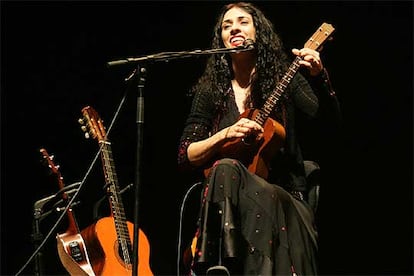The singer and songwriter Marisa Monte (Rio de Janeiro, 54 years old) is excited to finally reunite with her audience, first in her native Brazil, and now in Europe.
She this week she performs in Madrid (The Nights of the Botánico, this Thursday) and in San Feliu de Guíxols (Porta Ferrada Festival, July 2).
"In my professional life, I've never gone this long without playing live," she says during a phone interview.
The artist can finally present her latest solo album,
Portas
, live during the pandemic and recorded by Zoom from Rio, Lisbon, Los Angeles and New York.
It combines pop, jazz and soul.
"Doors signify passages, changes, choices, decisions, possibilities, openings, also closings," she explains over the phone while waiting at Milan airport for the flight that will take her to Brussels.
The also member of the band Tribalistas, along with Arnaldo Antunes and Carlinhos Brown, answers very softly so as not to disturb the rest of the passage.
The album talks about doors that can “carry out transformations and external changes, but also about doors that we can open within ourselves.
To achieve, through art, through the imaginary, an existence that is a little more poetic, more interesting than everyday life”.
More information
Marisa Monte: “It is easier for Brazilian musicians to succeed if they go to the US, but I wanted to stay”
An invitation to escape, not to lose joy, in turbulent times like the current ones.
Although the world is looking at the end of the pandemic, Brazil is mired in multiple crises, divided by polarization and with tense elections on the horizon, while Europe suffers a war difficult to imagine a year ago.
Brazilian culture has become the scene of political battle since the far-right Jair Bolsonaro came to power.
The singer admits that art "has been highly persecuted by the current government."
But she takes it as an impulse to make better music, more poetry, as the most effective way to resist attacks.
She prefers to answer that way, rather than giving an explicit opinion on politics.
But she is no stranger to conflict.
At her recent concert in London, she gave prominence to British journalist Dom Phillips and Brazilian indigenist Bruno Pereira, murdered in the Amazon in early June.
The singer sees Brazil "submerged in multiple overlapping crises, in a very difficult, challenging moment", but fully trusts in the future: "I am certain that it will bring a more humanist, more enlightened wave, back to values that require be affirmed and defended like the environment or culture”.
Proof that this lady of Brazilian music is not afraid of innovations, this tour is also broadcast on TikTok, one of the fastest growing social networks in recent times.
For Monte it is a way of having direct contact with his audience, as well as exploring new territory.
Shortly before leaving for Europe, he premiered his song
more recent.
The single has a chorus that exudes optimism.
She proclaims: “I feel happy, cheerful and strong.
I have love and I am lucky.”
The Brazilian says that for her it is a mantra.
She reveals that the song was born from a double inspiration.
On the one hand, the father of a friend who lives in Rio, born in Germany, a survivor of the Nazi concentration camps, who "had that motto written on the wall of her house."
“She didn't like to talk about all the terrible things she had suffered.
Thanks to that positivity, she managed to overcome it, build affection, friends, family, work, a very beautiful life story.
He passed away at 100 years old.”
The other inspiration comes from the indigenous people of Acre, who have a similar attitude, he says a friend who visits them told him.
“When an Indian wants to conquer important things, such as health, strength, ability to hunt, courage… he follows a kind of diet.
He spends six months without complaining about anything, without speaking ill of anything, without mentioning or connecting with anything negative.
Cordon sanitaire with bad experiences.
Marisa Monte during a concert in Madrid in 2019. Bernardo Pérez Tovar
The
Rolling Stones
magazine considers two of Marisa Montes' albums among the best in history.
She doesn't let that overwhelm her.
“I always try to do my best, I'm happy when I put my all into a project.
But once it's over, what happens to it is out of my control."
Last Sunday Brazil surrendered at the age of 80 to Gilberto Gil.
Caetano Veloso meets them in August.
Milton Nascimento is on his farewell tour.
Is Brazilian popular music heading towards the end of an era?
She, who has been listening to them all her life, replies: “We are very lucky to have such fertile and long-lived artists still creating and producing, sharing their view of the world.
Brazil wins with every minute, with every day of their lives”.
When not out on tour, Marisa Monte lives in Rio with her family.
And she works.
She works a lot, she says.
And she leads a very normal life.
“Although the public doesn't see it, I'm recording, composing, researching, producing”.
The album
Portas,
for example, is the result of "a year and a half of direct work and work accumulated over 54 years".
Throughout his career he has thoroughly investigated
bossa nova
and recovered various musical styles.
For her it is not a mission, nor a passion.
It is her way of working in an ecosystem like the one in this country.
“Brazilian culture is diversity, miscegenation.
We are a very young and curious country that also absorbs styles from abroad and transforms them through digestion into new original styles”.
And then there are the classics like the samba carioca, the most characteristic music of Rio de Janeiro, where he was born and lives.
The samba "is a great source of information about what it is like to live in Rio."
It is also the rhythm that he absorbed through his pores since childhood.
He considers the samba carioca as “existential chronicles, chronicles of everyday life in the neighborhoods of Rio.
They represent a very pure relationship between the artist and his creations, they translate very spontaneous feelings, they have a lot of real life, without ulterior motives”.
50% off
Exclusive content for subscribers
read without limits
subscribe
I'm already a subscriber











